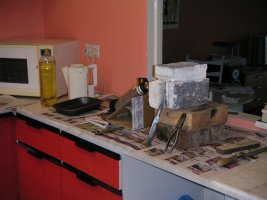For forging using gas those BBQ bricks are rubbish/garbage/useless. You need a soft fire brick, which is insulative, not just a brick that is made to withstand BBQ heat. Totally different thing from bricks you would build anything in your garden.
Look for somewhere that sells pottery supplies, they often have ceramic wool or soft fire bricks. You can make a one or two brick forge that will work just fine with a propane plumber's torch.
You could make a mini freon tank forge with ceramic wool.
This page contains information to allow you to build your own top quality propane forge and propane burners.
ronreil.abana.org
Also, this is a site with a lot of info in it, from an earlier age, so to speak.
This page contains information to allow you to build your own top quality coal or propane forges and propane burners. It also has information on many of my tools, as well beekeeping, and my family.
ronreil.abana.org
This is how I started out for heat treating blades in my kitchen. I am fully aware of how poor this arrangement was. Those white bricks on top are soft fire bricks. The beige ones are hard fire bricks. These were all salvaged from my work when they tore the building down.
View attachment 72416
I think you should be clear about what it is that you are aiming to do and why you want to do it. If you want to learn to re-purpose scrap into something somewhat useful, or whether you are aiming to learn to make quality cutting tools. Not saying that amazing things cannot be made with basic tools using salvaged steel, but it is a hard road with a lot of challenges to overcome. Not least that mystery scrap steel won't help you learn to forge tools as well as using known material that is in a known starting condition. I have seen others start on a similar path without actually understanding what they were setting themselves up for.
Example. You don't have prior experience, you get a piece of lawn mower blade or truck spring hot in your DIY forge that uses a weed burner, hammer it against your post anvil, and find that it does not move. Why? Is it that the forge isn't hot enough, that you didn't leave the steel in long enough, that you weren't hitting hard enough, or that the steel has alloy content that makes it resistant? Same when you try to harden a finished tool. It gets hard-ish, but not great. How hot was the forge, how hot did the steel get, how long was it at that temperature and how consistent was it, did the atmosphere cause de-carb, does the steel actually have enough carbon to harden, was it the right type of quenchant and was the quench at the right temperature?
All the best
Chris


